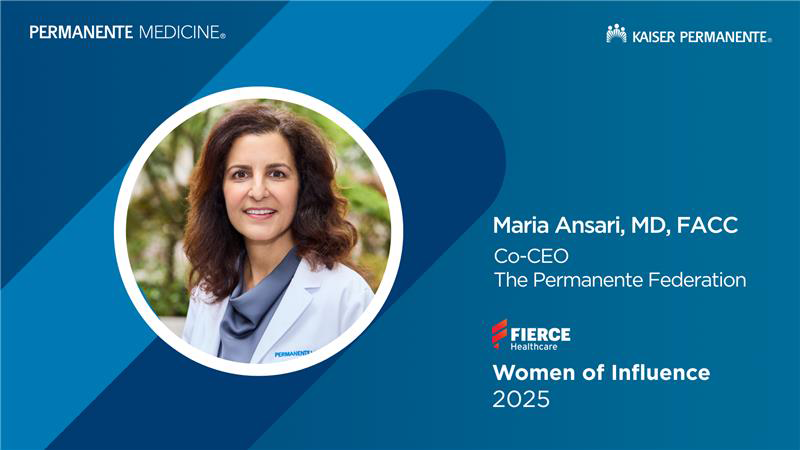Explore valuable lessons learned from Permanente physicians in 2025's rapidly changing health care landscape.

Protecting patients’ health in the face of climate change
Laura C. Myers, MD, MPH
No matter where we live in the world, climate change is significantly impacting our health. In fact, the World Health Organization calls climate change one of the greatest threats to public health. This occurs in a myriad of ways. Wildfires, severe storms, droughts, and heat waves make chronic health issues worse. Power outages impact the normal operation of chemotherapy infusion centers and pharmacies. Changes in temperatures and humidity impact the spread of infectious diseases. A better understanding of how climate change crises affect the health of our communities is crucial and may point us to better prevention strategies that directly help patients.
How is Kaiser Permanente preparing our patient population for the future?
As a fully integrated health care system, at Kaiser Permanente we understand the importance of preventive medicine and coordination of care for our patients. For example, we are working to integrate air quality prediction tools into our member database in order to alert members when air quality is projected to be poor. When disasters hit, we want to be able to protect the health of our members who are living in our communities. We are particularly interested in identifying which patients are most vulnerable, so we can build programs that bring the right equipment and clinical expertise to the right patient, at the right time. Information from Kaiser Permanente on extreme heat/cold, wildfires, and floods exist here.
Clinicians play a key role in patient preparedness
Clinicians have an essential role to play in directly preparing patients and their families. In my experience, patients do better when they have action plans for what to do in case of emergency, including environmental disasters. For example, if a patient depends on supplemental oxygen and is immobile, will they need additional backup oxygen tanks or battery-powered nebulizer machines during a power outage? If a patient needs dialysis and can’t drive because of flooding or landslides, how will they get hemodialysis? Additionally, climate change does not affect everyone equally, and often exacerbates existing inequalities related to income and race. We have to be mindful of this reality and work to lessen these inequalities.
Related climate change podcast: Climate change and its impact on human health
How are we limiting the footprint of our own healthcare system on the environment?
We are leading the nation to limit our own contributions to harmful emissions. Here are some of the steps that we, at Kaiser Permanente, are taking toward sustainability:
- We achieved carbon neutral status in 2020 by buying enough clean energy and carbon offsets to remove more greenhouse gases from the atmosphere than we emit.
- We have built infrastructure focused on renewable energy. In Richmond, we operated California’s first hospital-based renewable microgrid, which collects, stores, and releases energy on demand. In San Diego, we operated California’s first LEED Platinum certified hospital. As of 2024, there are 74 LEED certified buildings within the Kaiser Permanente network.
- We made investments in water conservation by reducing water use through initiatives like low-flow and automatic water fixtures, smart irrigation systems, and drought-tolerant landscaping.
- We decreased greenhouse gas emissions by 78% using low-polluting anesthesia. Emissions from anesthesia decreased from 13,500 to 3,000 metric tons of carbon dioxide equivalent per year between 2014 and 2022.
- We decreased waste and overuse by establishing guidelines for appropriate surgical attire and use of surgical packs. In 2020, we reused, recycled, or composted 49% of nonhazardous waste we generated. Our goal for 2025 is to do this for 100% of nonhazardous waste.
These efforts have required innovative, long-term strategic thinking and participation from the collective “we” at Kaiser Permanente. I’m proud to work at an organization that is supporting these efforts.
Leading the charge for patient health and a sustainable future
As physician leaders, we can help minimize the stressors from climate change by spearheading preparedness procedures and engaging in unique, proactive ways to raise awareness of environmental challenges and potential solutions. There is still a lot of work to do, and we must take action now to reduce the health risks of climate change, promote patient care in the face of these disasters, and preserve our planet for the future.
Laura C. Myers, MD, MPH, is a pulmonary/critical care physician and research scientist at the Kaiser Permanente Northern California Division of Research. She is the principal investigator on a federal grant from the National Institutes of Health to study scalable solutions to protect patients with lung disease from smoke during wildfire season. You can learn more about her primary research interests, studies, and publications here.


